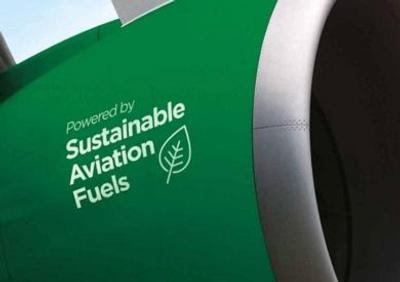Tue, Nov 30, 2021
First Study on Commercial Jet Travel on 100% Sustainable Fuel
A joint study on the impact of 100% sustainable aviation fuel (SAF) on both engines of a commercial jet have shown highly promising results in the early phases of analysis, says Airbus. Working with fellow industry veterans Rolls-Royce, fuel production specialist Neste, and German Research Centre DLR, the test is the first time that both engines of a commercial passenger aircraft have been run on 100% sustainable fuel, a departure from the norm.

The study focuses on the in-flight emissions on the Airbus A350 and its Rolls-Royce Trent XWB engines. Associated ground testing began in early 2021 and has continued with expansion to the program. Additional research publications are expected from the National Research Council of Canada and the University of Manchester towards the end of 2022. The program comes during a widespread push for SAF to bridge the gap between aircraft in service and futuristic, currently hypothetical electric passenger aircraft. Previous studies in the same program tested the results of mixtures up to 50% of newer, greener options, paving the way for today's promising efforts.
The lower density, but higher energy content per pound of SAF compared to conventional kerosene brings some efficiency improvements through lower fuel burn and less needed fuel weight for the same mission, according to the preliminary results. Thus far, the fuel change has shown little negative impact on the engines, both on the ground and in the air, said Simon Burr of Rolls-Royce. Throughout the testing, a chaser DLR Falcon followed the testbed with a full suite of measurement equipment to evaluate emissions during the flight.

“Engines and fuel systems can be tested on the ground but the only way to gather the full set of emissions data necessary for this program to be successful is to fly an aircraft in real conditions,” said Steven Le Moing, New Energy Program Manager at Airbus. “In-flight testing of the A350 offers the advantage of characterizing direct and indirect engine emissions, including particulates from behind an aircraft at high altitude.”
The campaign will continue, expected to show significant benefits aside from the decreased burn and carbon emissions. Markus Fischer of DLR's Aeronautics Board says the study shows SAF "to have a significantly lower carbon footprint over its life cycle compared to conventional jet fuel." That's not all, he continued: "now we are seeing it is advantageous in reducing non-CO2 effects too. Tests such as these are continuing to develop our understanding of 100% SAF, its use in flight and we are seeing positive signs for its potential in climate mitigation."
More News
Also: ANOTHER Illegal Drone, KidVenture Educational Activities, Record Launches, TSA v Shoes The Senate confirmed Bryan Bedford to become the next Administrator of the FAA, in a ne>[...]
Also: Sully v Bedford, Embraer Scholarships, NORAD Intercepts 11, GAMA Thankful Middle Georgia State University will be joining the Federal Aviation Administration’s fight ag>[...]
Also: DarkAero Update, Electric Aircraft Symposium, Updated Instructor Guide, OSH Homebuilts Celebrate The long-awaited Sonex High Wing prototype has flown... the Sonex gang tells >[...]
Also: Sully v Bedford, Embraer Scholarships, NORAD Intercepts 11, GAMA Thankful Middle Georgia State University will be joining the Federal Aviation Administration’s fight ag>[...]
30-Year USCG Veteran Aviator Focusing On Member Benefits The Vertical Aviation International Board of Directors announced its new leadership officers in April, and all began their >[...]
 Airborne 07.11.25: New FAA Boss, New NASA Boss (Kinda), WB57s Over TX
Airborne 07.11.25: New FAA Boss, New NASA Boss (Kinda), WB57s Over TX Airborne-Flight Training 07.10.25: ATC School, Air Race Classic, Samson School
Airborne-Flight Training 07.10.25: ATC School, Air Race Classic, Samson School Airborne Affordable Flyers 07.03.25: Sonex HW, BlackShape Gabriel, PRA Fly-In 25
Airborne Affordable Flyers 07.03.25: Sonex HW, BlackShape Gabriel, PRA Fly-In 25 Airborne-Flight Training 07.10.25: ATC School, Air Race Classic, Samson School
Airborne-Flight Training 07.10.25: ATC School, Air Race Classic, Samson School Rick Kenin New Board Chair of VAI
Rick Kenin New Board Chair of VAI




